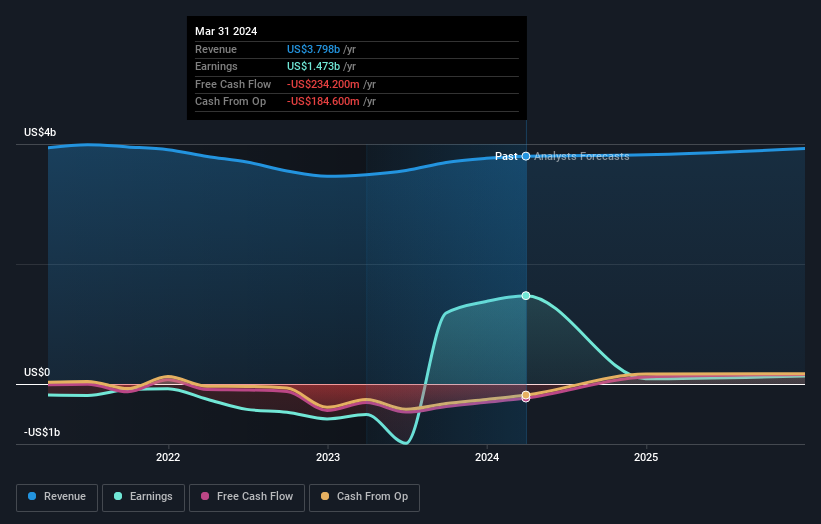- United States
- /
- Tech Hardware
- /
- NYSE:DBD
Both individual investors who control a good portion of Diebold Nixdorf, Incorporated (NYSE:DBD) along with institutions must be dismayed after last week's 7.4% decrease

Key Insights
- Significant control over Diebold Nixdorf by individual investors implies that the general public has more power to influence management and governance-related decisions
- A total of 12 investors have a majority stake in the company with 50% ownership
- Insiders have been buying lately
To get a sense of who is truly in control of Diebold Nixdorf, Incorporated (NYSE:DBD), it is important to understand the ownership structure of the business. The group holding the most number of shares in the company, around 35% to be precise, is individual investors. In other words, the group stands to gain the most (or lose the most) from their investment into the company.
While institutions who own 34% came under pressure after market cap dropped to US$1.3b last week,individual investors took the most losses.
Let's take a closer look to see what the different types of shareholders can tell us about Diebold Nixdorf.
View our latest analysis for Diebold Nixdorf

What Does The Institutional Ownership Tell Us About Diebold Nixdorf?
Institutional investors commonly compare their own returns to the returns of a commonly followed index. So they generally do consider buying larger companies that are included in the relevant benchmark index.
Diebold Nixdorf already has institutions on the share registry. Indeed, they own a respectable stake in the company. This can indicate that the company has a certain degree of credibility in the investment community. However, it is best to be wary of relying on the supposed validation that comes with institutional investors. They too, get it wrong sometimes. When multiple institutions own a stock, there's always a risk that they are in a 'crowded trade'. When such a trade goes wrong, multiple parties may compete to sell stock fast. This risk is higher in a company without a history of growth. You can see Diebold Nixdorf's historic earnings and revenue below, but keep in mind there's always more to the story.

Our data indicates that hedge funds own 31% of Diebold Nixdorf. That's interesting, because hedge funds can be quite active and activist. Many look for medium term catalysts that will drive the share price higher. Millstreet Capital Management LLC is currently the company's largest shareholder with 16% of shares outstanding. Meanwhile, the second and third largest shareholders, hold 8.1% and 6.5%, of the shares outstanding, respectively.
A closer look at our ownership figures suggests that the top 12 shareholders have a combined ownership of 50% implying that no single shareholder has a majority.
Researching institutional ownership is a good way to gauge and filter a stock's expected performance. The same can be achieved by studying analyst sentiments. There is a little analyst coverage of the stock, but not much. So there is room for it to gain more coverage.
Insider Ownership Of Diebold Nixdorf
The definition of company insiders can be subjective and does vary between jurisdictions. Our data reflects individual insiders, capturing board members at the very least. Company management run the business, but the CEO will answer to the board, even if he or she is a member of it.
Most consider insider ownership a positive because it can indicate the board is well aligned with other shareholders. However, on some occasions too much power is concentrated within this group.
Our data suggests that insiders own under 1% of Diebold Nixdorf, Incorporated in their own names. Keep in mind that it's a big company, and the insiders own US$7.0m worth of shares. The absolute value might be more important than the proportional share. It is good to see board members owning shares, but it might be worth checking if those insiders have been buying.
General Public Ownership
The general public-- including retail investors -- own 35% stake in the company, and hence can't easily be ignored. While this size of ownership may not be enough to sway a policy decision in their favour, they can still make a collective impact on company policies.
Next Steps:
While it is well worth considering the different groups that own a company, there are other factors that are even more important. For instance, we've identified 3 warning signs for Diebold Nixdorf that you should be aware of.
Ultimately the future is most important. You can access this free report on analyst forecasts for the company.
NB: Figures in this article are calculated using data from the last twelve months, which refer to the 12-month period ending on the last date of the month the financial statement is dated. This may not be consistent with full year annual report figures.
New: Manage All Your Stock Portfolios in One Place
We've created the ultimate portfolio companion for stock investors, and it's free.
• Connect an unlimited number of Portfolios and see your total in one currency
• Be alerted to new Warning Signs or Risks via email or mobile
• Track the Fair Value of your stocks
Have feedback on this article? Concerned about the content? Get in touch with us directly. Alternatively, email editorial-team (at) simplywallst.com.
This article by Simply Wall St is general in nature. We provide commentary based on historical data and analyst forecasts only using an unbiased methodology and our articles are not intended to be financial advice. It does not constitute a recommendation to buy or sell any stock, and does not take account of your objectives, or your financial situation. We aim to bring you long-term focused analysis driven by fundamental data. Note that our analysis may not factor in the latest price-sensitive company announcements or qualitative material. Simply Wall St has no position in any stocks mentioned.
Have feedback on this article? Concerned about the content? Get in touch with us directly. Alternatively, email editorial-team@simplywallst.com
About NYSE:DBD
Diebold Nixdorf
Engages in the automating, digitizing, and transforming the way people bank and shop worldwide.
Very undervalued with excellent balance sheet.
Similar Companies
Market Insights
Community Narratives




